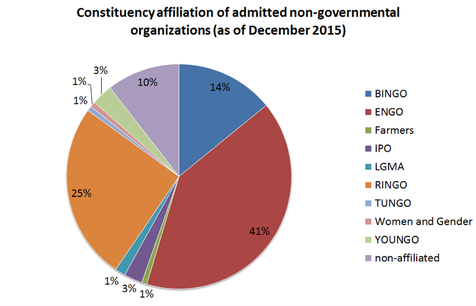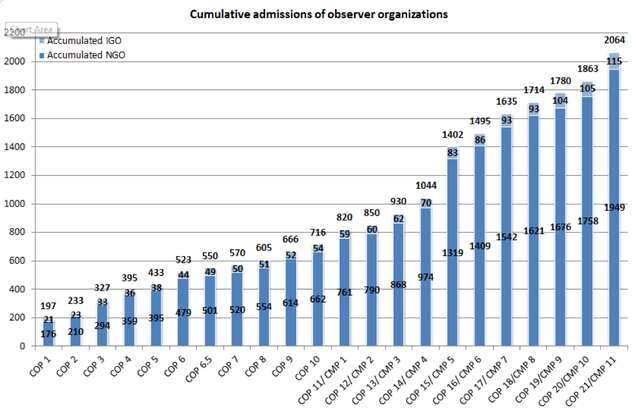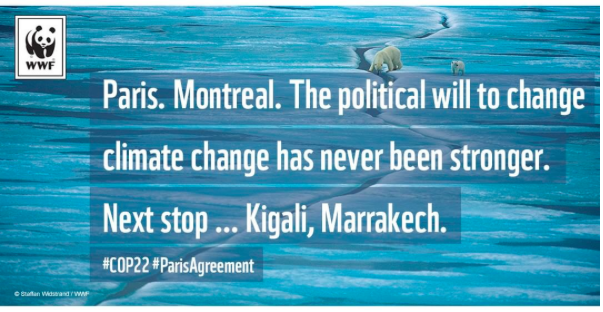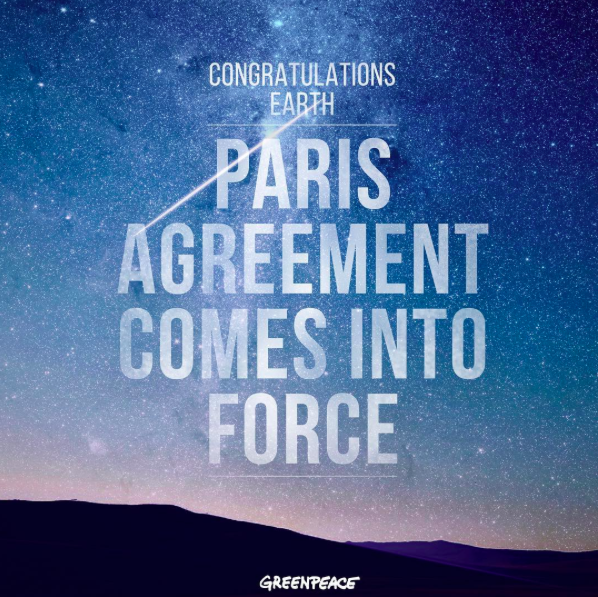|
When I first started learning about the UNFCCC, I thought involvement was primarily from official representatives of countries. I was surprised to learn of the growing involvement of NGOs and other observer organizations. An NGO (non-governmental organization) is a non-profit organization that is independent of the government and can be formed at the local, national, or international level. The number of accumulated NGOs increased from 176 organizations at COP1 to 1,969 organizations at COP21. Who Attends UNFCCC Events? The UNFCCC allows three categories of participants to attend meetings and conferences:
The observer organizations consist of several other categories, notably: non-governmental organizations, intergovernmental organizations, and the United Nations systems and its Specialized Agents.  What NGOs are involved with the UNFCCC? As you can see in the figure displaying the constituency affiliation of NGOs, 41% of NGOs consist of “ENGOs,” or environmental non-governmental organizations. An ENGO specifically focuses on work with the environment, such as depletion of natural resources, species conservation, or climate change mitigation. Here are a few ENGO examples, a subset of the many admitted NGOs at UNFCCC events: 1.WWF The World Wildlife Fund (WWF) was formed in 1961 with the goal to protect Earth’s species and natural places through work with local communities, governments, and other NGOs. The WWF works with the UN and with governments to help ensure that low-carbon emissions are met. They are planning to continue their work again at COP22. 2. Greenpeace International Greenpeace was formed in 1971 to campaign to protect Earth and is now a global campaigning organization that seeks to transform attitudes and beliefs to increase environmental protection. Greenpeace releases position statements for all of the international climate negotiations primarily for policy makers or journalists who want to gain more information about the negotiations. 3. The Nature Conservancy The Nature Conservancy was formed as a nonprofit organization in 1951 and seeks to protect Earth’s lands and waters for both nature and people. The Nature Conservancy helped stakeholders understand the complexities of the Paris Agreement and negotiations at COP21. They are continuing to work to promote climate action and have released statements and blog posts about the negotiations. Why does it matter? Observer organizations, specifically NGOs, have the power to make positive impacts in international climate negotiations. NGOs can increase public awareness through campaigns and education, cultivating a culture of climate awareness and environmental appreciation. Furthermore, NGOs can implement changes in their own organizations or help other organizations make changes to drastically limit their effects on the environment, such as through reduction of green house gas emissions or through ensuring sustainable supply chains. I am looking forward to learning more about NGO involvement in the upcoming negotiations. I will close with sharing a short clip from Earth Hour, the nonprofit created by WWF, to increase global climate action. Here you can see the work being done to amplify the effects of the Paris Agreement, and encourage climate action. Ultimately, every action can make a difference: Sources:
Figures: http://unfccc.int/parties_and_observers/observer_organizations/items/9545.php Observer information: http://unfccc.int/parties_and_observers/observer_organizations/items/9524.php WWF: http://wwf.panda.org/who_we_are/ Greenpeace: http://www.greenpeace.org/international/en/about/ The Nature Conservancy: http://www.nature.org/about-us/index.htm?intc=nature.tnav.about
0 Comments
Leave a Reply. |
Categories
All
Archives
March 2024
|



 RSS Feed
RSS Feed
